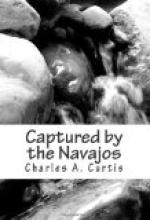A mile down the shore he saw a crowd of men, mounted and on foot, intently watching something inland. He was approaching the race-course. He made a landing on a sand-spit that struck off from an outward curve of the bank, and dragged the balsa out of the water.
The shore rose abruptly from the bar to a height two feet above his head. He lifted and boosted Vic up, and seizing the long tufts of overhanging grass and thrusting his feet into the loops of willow roots, drew himself to the higher level and crept into a screen of low bushes.
Peering through the branches, Henry saw a straight-away course, parallel to the river, bordered for three hundred yards with the motley crowd of a mining and Indian country. At the northern end of the course was a group of ten ponies, out of which he found no difficulty in discovering two, a black and a cream-color, and recognizing in them the property of his brother and himself. In his opinion they were the handsomest animals in the group.
At the fourth signal—a pistol-shot—the ponies got away. Down the three-hundred-yard track they sped, and over the last fourth the black and cream-color led by a length, crossing the goal with Sancho half a neck in advance. Of course the little sergeant knew they would beat, and in spite of his sorrow at the loss of his ponies—intensified by this stolen sight of them—he could not refrain from clapping his hands and saying, aloud, “Bravo, Sancho! Bravita, Chiquita!”
The subdued cheer was promptly answered by a succession of barks at the foot of the tree, and Vic, interpreting the boy’s clapping and speech to mean that she was free to go, dashed off at the top of her speed for the race-course, and to its southern end, where the victors were now held by their dismounted riders. Vic bounded wildly about them for a few moments, and then, standing still, Henry saw each horse in turn place its nose to the dog’s nose. One of the men struck the dog sharply with the loop of his bridle-rein, and as she fled back in the direction of the tree in which the boy was, he saw the riders hold a brief consultation and then follow the dog.
Henry, perceiving he was discovered, let himself down from the tree. Texas Dick and Jumping Jack approached.
“Ven aca, muchacho” (Come here, boy), said the Mexican.
Henry did not stir, and Dick said to his companion, in Spanish: “He does not understand your lingo. I will try him in English: Come here, boy.”
Henry had not disregarded Juan’s summons for any particular reason, but the remark of Dick gave him an idea. By pretending ignorance of Spanish he might learn something that would be of advantage to him. Accordingly, he came forward when Dick spoke.
“From Fort Whipple, ain’t yer, sonny?”
“I am.”
“D’ ye know these critters?”
“The black is my brother’s, the light is mine.”
“Lookin’ on ’em up, I s’pect?”




